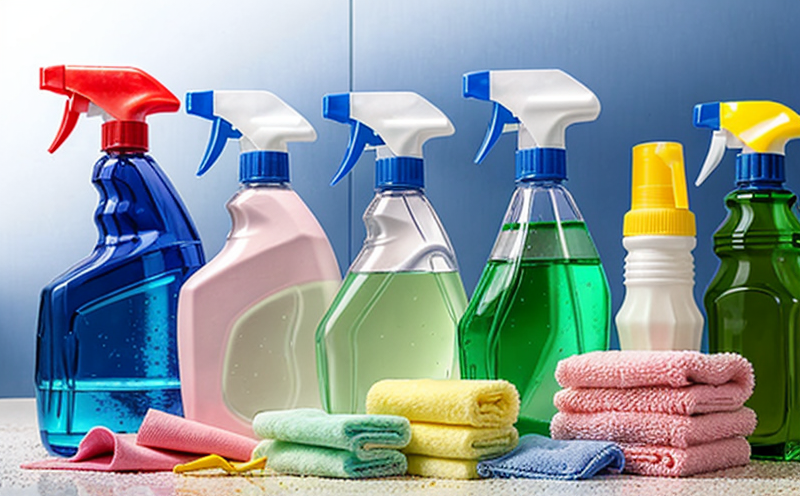Allergen Testing in Detergent Formulations
Ensuring consumer safety and compliance with regulations is a critical responsibility for manufacturers of cleaning products and detergents. Allergens are an increasing concern, especially as consumers demand more transparent and safe product formulations. Our lab offers comprehensive allergen testing services to help you identify potential allergens in your detergent formulations and ensure they meet strict regulatory standards.
Regulatory bodies like the European Union's Cosmetic Regulation (EC 1223/2009) and the U.S. Food and Drug Administration (FDA) mandate that manufacturers test for certain known allergens before bringing products to market. These regulations are in place to protect consumers from potential allergic reactions, which can range from mild irritation to severe anaphylaxis.
Our laboratory employs advanced analytical methods such as enzyme-linked immunosorbent assays (ELISAs), liquid chromatography-mass spectrometry (LC-MS/MS), and gas chromatography-mass spectrometry (GC-MS) to detect allergens in detergent formulations. These techniques allow for precise quantification, even at trace levels.
The testing process typically involves the following steps:
- Sample preparation: The detergent formulation is diluted and filtered as necessary to ensure accurate analysis.
- Extraction: Targeted extraction methods are used based on allergen type (e.g., proteins, carbohydrates).
- Analytical detection: Samples are analyzed using the specified analytical techniques mentioned above.
The results of these tests are reported according to international standards such as ISO 15216-1 and FDA regulations. This ensures that your products meet global standards for safety and quality.
Our lab has extensive experience working with various types of detergents, including laundry detergents, dishwashing liquids, and all-purpose cleaners. We understand the unique challenges faced by each product category when it comes to allergen testing. For instance, laundry detergents may have higher levels of surfactants which can interfere with certain tests.
One challenge in allergen testing is identifying new or emerging allergens that are not yet regulated but could pose a risk to consumers. Our team stays updated on the latest research and guidelines from organizations like the World Health Organization (WHO) and the European Food Safety Authority (EFSA).
| Tested Allergens | Regulatory Standards Met |
|---|---|
| Milk proteins (casein, whey) | EC 1223/2009, FDA |
| Soybeans (glycinin, albumin) | EC 1223/2009, FDA |
| Eggs (ovomucoid, ovalbumin) | EC 1223/2009, FDA |
| Nuts (peanut allergens like Ara h 1, Ara h 2) | EC 1223/2009, FDA |
In addition to these common allergens, we can also test for other components that may trigger allergic reactions such as fragrances or preservatives.
Eurolab Advantages
- Expertise and Experience: Our team includes highly skilled chemists with years of experience in allergen testing.
- State-of-the-Art Facilities: We have the latest equipment for efficient sample preparation and analysis.
- Comprehensive Reporting: Detailed reports are provided along with recommendations to improve product safety.
- Regulatory Compliance: Our services meet global regulatory requirements ensuring your products can be sold internationally.
We pride ourselves on delivering accurate, reliable results in a timely manner. This is crucial for maintaining good standing with customers and regulators alike.
Quality and Reliability Assurance
- Accreditation: Our laboratory is accredited to ISO/IEC 17025:2017 standards ensuring our methods are robust and reproducible.
- Data Integrity: All data is stored securely following strict protocols set forth by relevant bodies.
We understand the importance of maintaining high-quality processes throughout every stage of allergen testing. This includes rigorous quality control measures during sample preparation, analysis, and reporting.
To further enhance reliability, we follow established procedures for handling samples from receipt through final disposition. Our staff undergo continuous training to stay current with industry trends and best practices in allergen detection technology.
Use Cases and Application Examples
- New Product Development: Identifying potential allergens early in the development process allows for proactive adjustments that enhance consumer safety.
- Compliance Audits: Regular testing helps ensure ongoing compliance with changing regulations regarding allergen content.
- Patient Feedback: Analyzing patient feedback to identify new or unexpected allergens can lead to improvements in product formulations.
| Product Category | Allergen Type | Regulatory Standard Met | Application Example |
|---|---|---|---|
| Dishwashing liquid | Nut allergens (peanut) | EC 1223/2009, FDA | A manufacturer identified peanut traces in their dishwashing liquid after receiving several customer complaints about allergic reactions. |
| Laundry detergent | Egg allergens (ovalbumin) | EC 1223/2009, FDA | A company successfully reformulated its laundry detergent to eliminate egg allergens following our test results. |
| All-purpose cleaner | Soybean allergens (glycinin) | EC 1223/2009, FDA | An industrial cleaner was modified based on our findings to remove soybean derivatives that could cause allergic reactions. |
The examples above illustrate how our allergen testing services have contributed to improving product safety and compliance. By addressing potential allergens early in the process, manufacturers can avoid costly recalls and maintain trust with their customers.





